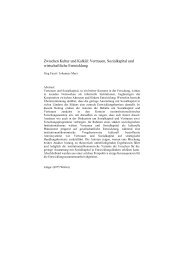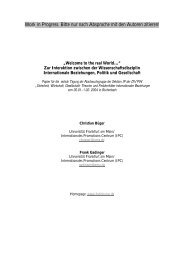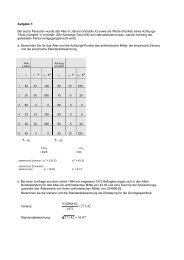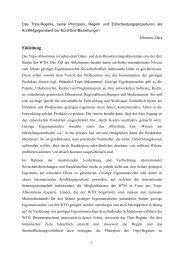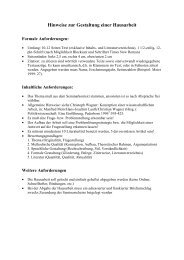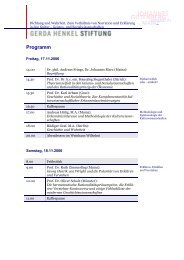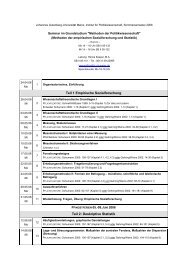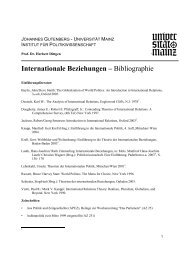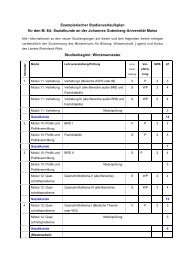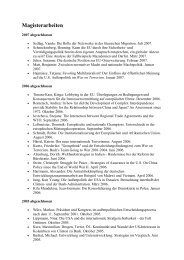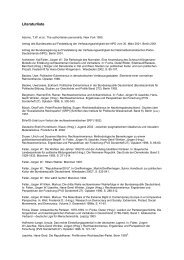Feedback Effects in Foreign Policy: A Framework for Analysis
Feedback Effects in Foreign Policy: A Framework for Analysis
Feedback Effects in Foreign Policy: A Framework for Analysis
You also want an ePaper? Increase the reach of your titles
YUMPU automatically turns print PDFs into web optimized ePapers that Google loves.
18<br />
them. Different strands of critical theoriz<strong>in</strong>g have highlighted the importance of the social<br />
reproduction of <strong>in</strong>stitutions. This reproduction can be construed as one particular k<strong>in</strong>d of<br />
feedback loop <strong>in</strong> which states are predisposed by exist<strong>in</strong>g <strong>in</strong>stitutions to follow a certa<strong>in</strong> path<br />
of action; and by actually follow<strong>in</strong>g that path contribute to the cont<strong>in</strong>u<strong>in</strong>g existence of this<br />
<strong>in</strong>stitution.<br />
When tak<strong>in</strong>g together what we have said about the <strong>in</strong>terrelation of <strong>in</strong>stitutions and<br />
<strong>for</strong>eign policies, we arrive at a first basic picture of how feedback effects <strong>in</strong> <strong>for</strong>eign policy can<br />
work. International <strong>in</strong>stitutions predispose actors towards certa<strong>in</strong> courses of action by<br />
constitut<strong>in</strong>g goals or constra<strong>in</strong><strong>in</strong>g actions. <strong>Foreign</strong> policies, <strong>in</strong> turn, contribute to the<br />
reproduction or change of the <strong>in</strong>stitutions by adher<strong>in</strong>g to <strong>in</strong>stitutional rules, deviat<strong>in</strong>g from<br />
them or renegotiat<strong>in</strong>g them.<br />
There and back aga<strong>in</strong> II: The <strong>in</strong>ternational distribution of power and <strong>for</strong>eign policy<br />
That <strong>for</strong>eign policies may be affected by the <strong>in</strong>ternational distribution of power is probably<br />
one of the oldest assumptions of <strong>in</strong>ternational political thought. It is easy to see the basic<br />
<strong>in</strong>tuition: What you do is fundamentally related to what you are able to do; and what states<br />
can do <strong>in</strong> the <strong>in</strong>ternational system is <strong>in</strong>timately l<strong>in</strong>ked to their power relative to other states.<br />
Power is understood here as the control over certa<strong>in</strong> resources that may allow a state to<br />
achieve its goal <strong>in</strong> the <strong>in</strong>ternational system, <strong>in</strong>clud<strong>in</strong>g military capabilities but also economic<br />
resources.<br />
The idea that a state's power <strong>in</strong>fluences its <strong>for</strong>eign policy has been spelled out time<br />
and aga<strong>in</strong> <strong>in</strong> realist writ<strong>in</strong>g. More often than not this l<strong>in</strong>k is assumed to be quite direct. In<br />
this view, the strive <strong>for</strong> power is taken to lie at the very heart of <strong>in</strong>ternational relations. States<br />
use power as a means and pursue power as an end (e.g. Morgenthau 1948). Consequently<br />
states will be <strong>in</strong>cl<strong>in</strong>ed to seek power and they be will <strong>for</strong>ced to bow to the power and<br />
<strong>in</strong>fluence of superior states. Great powers and small states will there<strong>for</strong>e display different,<br />
characteristic k<strong>in</strong>ds of <strong>for</strong>eign policy.<br />
Structural realists have argued that the l<strong>in</strong>k between power and policy may not be<br />
quite so straight<strong>for</strong>ward (e.g. Waltz 1979). From their po<strong>in</strong>t of view, power is not an end by<br />
and <strong>for</strong> itself <strong>in</strong> states' <strong>for</strong>eign policies. Rather, they regard the <strong>in</strong>ternational distribution of<br />
power as an opportunity structure which enables states to pursue certa<strong>in</strong> actions and<br />
constra<strong>in</strong>s them from pursu<strong>in</strong>g others. States may respond rationally to this opportunity<br />
structure, <strong>in</strong> which case their <strong>for</strong>eign policies will display a certa<strong>in</strong> <strong>in</strong>cl<strong>in</strong>ation to seek power,




